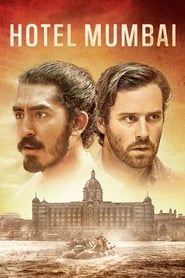All of this rather abstract discourse arguing about whether films that mine atrocities for cheap thrills are exploitative does conveniently obscure the fact that, at the end of the day, Hotel Mumbai is a deeply Western-centric and Islamophobic movie.
At first, I genuinely thought the film was going to be, in part, a satire on the privilege, vanity and self-absorption of the rich hotel guests staying at the hotel and that Western hubris was going to somehow speak to some broader arrogance of the Anglosphere in their dealings in some vaguely defined 'Orient'. After all, it is never conveyed why it is this mass murder compared to the café and train station (etc.) that warrants this level of attention. Communicating to a hotel ahead of time that your nanny wants a bath (at a precise temperature!) upon your arrival would quickly be cut from the likes of Parasite or Triangle of Sadness for being far too crass and clichéd an observation. Yet this and many parallel examples of unexamined and flaunted wealth are bizarrely included as an invitation to sympathise with them. (Also notice how the camera will always use one of the Westerners in a group, such as when they are moving between rooms.) Later on, it was mind-boggling to me how well the "exclusive Chambers Club" encapsulates both the broader physical and symbolic desire of separation from the 'bad people' in the outside world... although for a deeper yet flawed critique of that concept, I would see David Fincher's 2002 Panic Room, a film that is also 'about' a terrorist attack (in this case, 9/11), but never even mentions it.
The way the film treats Islam over other religions is nothing short of outrageous, however. Minutes of tender screentime are used to show how Dev Patel is deeply connected to his dastār and cannot remove it for theological and cultural reasons. Yet the film soon implies that he (and, by extension, Sikh culture in general) does not take that religious belief to 'extremes' by taking it off to attempt to save a white woman's life. By contrast, of course, the Muslims are depicted as not only being cartoonishly obsessed with whether something is haram or not, but they simultaneously and disrespectfully treat the concept of halal as a kind of joke or a sadistic prank to play on your friends. I could multiply examples, not including the implication that the terrorists had never seen a flushing toilet before (whilst they understand international dialling and electronic hotel keycards?) and the 'evil mastermind' puppetmaster that we only ever hear in a disembodied voice. It's all kinda gross in its obviousness. It felt like rewatching one of those Western TV series about Iraq circa 2004… Indeed, this is a film liked (and creepily enjoyed) only by those who don't think they have a problem with Islam, and, without mentioning any names, it is no wonder this film is so revered by all those public intellectuals who will swear blind that they aren't Islamophobic.
The final and almost equally irritating aspect of this film is the way the hotel staff are portrayed who, from beginning to end, display an excessively subservient attitude towards the hotel guests… whilst quite blatantly lying to their faces about what they know. Perhaps they do believe all this stuff and have internalised their servile "Guest Is God" mentality: I don't know. But if that's true, then I would contend that the 'heroic' staff of the Taj Hotel are probably also victims to a deeper and broader system of exploitation than, I dunno, merely needing to wear remotely suitable shoes in a huge, industrial kitchen. Of course, I'm not going to set myself up for a libel lawsuit here, but I'm guessing that this is not a complete and accurate reflection of the working conditions behind the scenes in a multinational hotel chain.
ps. Reading others' reviews is equally depressing in their confusion over the 'truth' of what is ultimately a piece of art: almost all of them seem to be booby-trapped with the response, "But that's a what actually happened!" A timely reminder that you should be immediately distrustful of the biopic genre and the words "Based on a true story".

